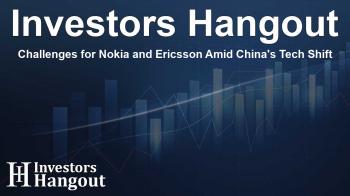Challenges for Nokia and Ericsson Amid China's Tech Shift

Nokia and Ericsson Face Regulatory Hurdles in China
Recent developments indicate that China is actively intensifying its regulatory scrutiny over prominent European telecom giants, including Nokia (NYSE: NOK) and Ericsson (NASDAQ: ERIC). This shift is particularly evident as their bids for vital infrastructure contracts undergo extended national security evaluations.
This move, highlighted by recent news, is seen as a tactical effort by President Xi Jinping to increasingly disengage the nation's technological framework from reliance on Western vendors.
The evolving regulatory landscape has significantly impacted both companies' positions within the Chinese market, culminating in considerable share losses.
New Security Review Protocols in China
Today, state-affiliated purchasers of IT solutions—including telecom operators, utilities, and other critical sectors—are conducting thorough examinations of foreign proposals. This pronounced scrutiny has mandated that contracts from these European firms be subjected to comprehensive national security checks governed by the Cyberspace Administration of China (CAC).
The CAC employs a method often referred to as "black box" assessments for foreign technologies, which includes telecom hardware from Nokia and Ericsson. This term indicates the lack of transparency regarding the review criteria and evaluation processes, leaving the companies uncertain about how their products are judged.
These national security assessments have become more stringent since an update to China's cybersecurity laws, which occurred recently, leading to potential review durations extending beyond three months, with little communication about the evaluation methods.
Additionally, state buyers now expect a wealth of documentation, including detailed specifications for each system component, demonstrating the depth of the scrutiny being applied to these contracts.
Broader Implications of Telecom Regulations
The tensions surrounding China-European telecom relations are largely reflective of the wider U.S.-China technological rivalry. This friction has allowed Chinese companies, particularly Huawei, to gain a formidable foothold in global 5G infrastructure.
The United States has persistently urged its European allies to exclude Chinese companies from their telecommunications networks, citing serious espionage and security threats.
Geopolitical tensions have surged notably after the imposition of U.S. sanctions targeting semiconductor technologies, particularly post the disruptions caused by the global pandemic.
Competitive Landscape and Ongoing Challenges
Nonetheless, the competitive landscape presents challenges that are not one-sided. Huawei and ZTE maintain a robust presence in Europe, together accounting for a significant proportion of the mobile infrastructure market, with countries such as Germany relying on these Chinese firms for a substantial part of their 5G installations.
Meanwhile, the U.S. government continues to exert pressure on Chinese telecom operators that wish to engage in the American marketplace. Investigations launched earlier this year targeted major Chinese firms, evaluating their potential mishandling of American data.
While these companies do not have permissions to provide retail internet or phone services within the U.S., there remain avenues for them to access U.S. data through other means, such as routing wholesale internet traffic.
The Current Market Scenario for Nokia and Ericsson
In the face of these ongoing challenges, both Nokia and Ericsson have reported significant revenue losses in recent fiscal periods. Nokia, for example, has experienced double-digit drops in sales since the previous year, resulting in its market share plunging from 12% in 2020 to an alarming 4% in the mobile networks sector of China.
Despite these setbacks, Nokia's shares rose by 1.24% to $4.88 in premarket trading, showing a year-to-date increase approaching 9%. At the same time, Ericsson experienced a 0.72% increase in premarket trading, maintaining a 3.5% gain year-to-date.
Frequently Asked Questions
1. What challenges are Nokia and Ericsson facing in China?
Nokia and Ericsson are currently dealing with heightened scrutiny from Chinese authorities concerning their bids for infrastructure projects, leading to significant revenue losses and dwindling market share.
2. What is a "black box" review?
A "black box" review refers to a non-transparent assessment process conducted by the Cyberspace Administration of China on foreign technology, including telecom equipment, where the evaluation criteria are not disclosed.
3. How has the market share of Nokia and Ericsson changed?
The combined market share of Nokia and Ericsson in China’s mobile networks has significantly decreased from 12% in 2020 to just 4% in 2024.
4. What external factors are contributing to these issues?
The ongoing U.S.-China technological rivalry, including U.S. sanctions on semiconductors, has exacerbated the situation, influencing Chinese regulatory attitudes toward Western technology firms.
5. How are Nokia and Ericsson performing in the stock market?
Despite the challenges, shares of Nokia and Ericsson have shown slight increases in premarket trading, with Nokia gaining approximately 9% year-to-date and Ericsson rising by 3.5%.
About The Author
Contact Owen Jenkins privately here. Or send an email with ATTN: Owen Jenkins as the subject to contact@investorshangout.com.
About Investors Hangout
Investors Hangout is a leading online stock forum for financial discussion and learning, offering a wide range of free tools and resources. It draws in traders of all levels, who exchange market knowledge, investigate trading tactics, and keep an eye on industry developments in real time. Featuring financial articles, stock message boards, quotes, charts, company profiles, and live news updates. Through cooperative learning and a wealth of informational resources, it helps users from novices creating their first portfolios to experts honing their techniques. Join Investors Hangout today: https://investorshangout.com/
The content of this article is based on factual, publicly available information and does not represent legal, financial, or investment advice. Investors Hangout does not offer financial advice, and the author is not a licensed financial advisor. Consult a qualified advisor before making any financial or investment decisions based on this article. This article should not be considered advice to purchase, sell, or hold any securities or other investments. If any of the material provided here is inaccurate, please contact us for corrections.

